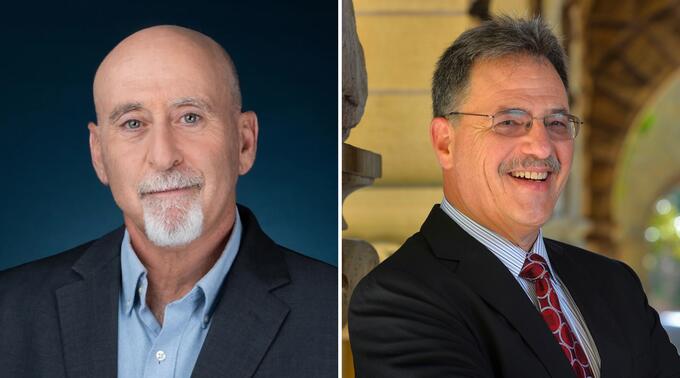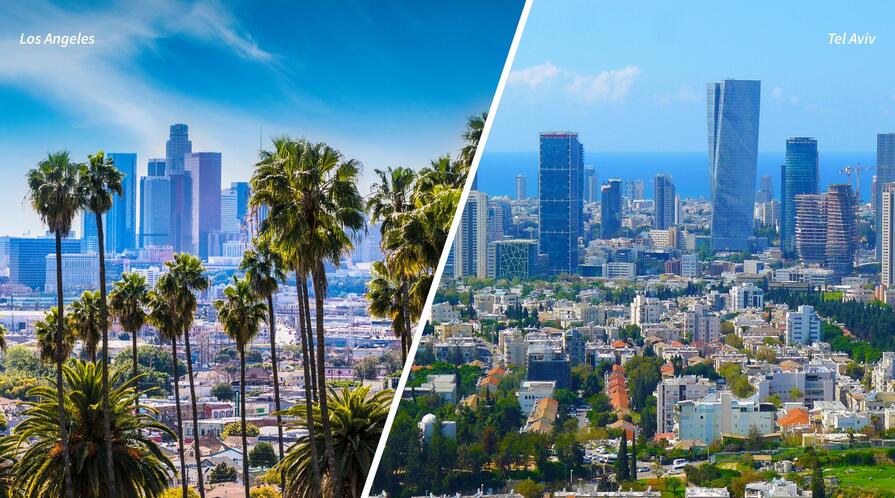Stanford University to Host Landmark Conference on Urban Climate Resilience
As the global climate crisis accelerates, cities around the world are grappling with an increasingly urgent question: how can local governments protect communities, infrastructure, and ecosystems from the rising tide of environmental disruption? This May, Stanford University will bring that question to the forefront with a landmark event examining how two dynamic and diverse cities — Los Angeles and Tel Aviv-Yafo — are responding to the climate challenge from the ground up.
Taking place May 29–30, 2025, and hosted by the Visiting Fellows in Israel Studies program at the Center on Democracy, Development and the Rule of Law (CDDRL) and the Environmental Social Sciences department at Stanford’s Doerr School of Sustainability, “Climate Resilience and Local Governmental Policy: Lessons from Los Angeles and Tel Aviv” will be the largest academic conference ever held on Israel’s climate policy. The two-day event will convene experts from both cities to explore how local institutions are building equitable, sustainable, and adaptive systems to confront growing environmental risks.
A Pivotal Moment for Climate Policy
In early May, Israel faced its second major wildfire in a month, as flames tore through the woodlands around Jerusalem, forcing the shutdown of the central region and the cancellation of Independence Day celebrations. Conference Chair, Professor Alon Tal, Visiting Fellow in Israel Studies and a leading environmental advocate, explained that once a rare occurrence, such fires have become far more frequent, reflecting a broader international pattern.
“In the past, fires of this magnitude maybe happened once a decade,” Tal noted. “But like California, Israel’s fire service now reports a tripling of high-risk fire days — ultra-dry conditions paired with high winds. This is an international phenomenon. This past year, Canadian fires destroyed 45 million acres of woodlands — seven times the annual average. Israel has received a wake-up call about the impacts of the climate crisis.”
Across two days of programming, the conference will bring together 25 Israeli experts to discuss potential solutions alongside colleagues from Los Angeles and California. “This is not just a policy conversation. This is about how we prepare our communities for an uncertain future,” Tal said. “Both Los Angeles and Tel Aviv are confronting real environmental risks, but they also have the innovation ecosystems and civic infrastructure needed to respond creatively. We have a lot to learn from studying them side by side.”
Comparing Los Angeles and Tel Aviv offers scholars and policymakers unique insights, Tal believes. “These are two of the most creative cities in the world. They both have thriving tech sectors and liberal city governments with resources and professional expertise. At the same time, they face comparable challenges: they are both dryland cities on rising coastlines, where heat waves are becoming more treacherous. Bringing their top experts together at Stanford has tremendous merit.”
Rethinking Climate Governance at the City Level
Tal emphasized that local governments are increasingly bearing the burden of climate adaptation, especially in societies marked by inequality and demographic complexity. “The changing climate brings new challenges that cities need to be ready for. And they aren’t,” he said. “Most people live in cities — they need the tools (and the budget) to reduce new risks. The LA fires have left enormous human suffering in their wake, just like the climate-driven floods in New Orleans, Houston, and New York City did. So, the question is: what steps should cities take proactively to avert disasters and maintain stability?”
While Tal emphasized the immediate environmental threats, Larry Diamond, Mosbacher Senior Fellow in Global Democracy at the Freeman Spogli Institute for International Studies (FSI) and director of the Visiting Fellows in Israel Studies program, framed the discussion within a broader governance context. “It is often said that ‘all politics is local,’ and there is a policy corollary to that. While we need national policies and international coordination to reduce fossil fuel emissions and accelerate the transition to renewable energy, the challenges of climate adaptation and resilience are also deeply local and must be met at that level. This is a great opportunity for all of us to learn from two cities on the front lines of the challenge in our respective countries — Tel Aviv and Los Angeles.”
A Vision for Collaborative Learning
The event also reflects the broader goals of Stanford’s Visiting Fellows in Israel Studies program, launched in 2023 to foster cross-disciplinary analysis of Israel and its unique position as a regional influence and geopolitical actor. The program appoints an Israel-based scholar to serve as a visiting fellow at FSI for a recurring three-year term. The fellow will teach courses related to some aspect of Israel’s politics, society, economy, modern history, technological development, and/or regional or international relations, as well as advise students and collaborate with faculty interested in Israel and the Middle East.
Diamond emphasized the significance of the conference in fulfilling the program’s mission. “One of our key goals in the Israel Studies Program is to engage scholars, policymakers, and civil society leaders in Israel, not only individually but collectively based on their expertise. And we seek to promote functional and scholarly interaction and mutual learning. This conference is a historic opportunity to advance this mission in the realm of climate resilience.”
Tal also highlighted the significance of hosting the conference at Stanford. “Stanford has become the world’s leading academic center for researching critical ecological problems like biodiversity and climate change. The Doerr School of Sustainability and the involvement of Nobel laureate Steven Chu as a keynote speaker make this an unparalleled opportunity for collaboration.”

Building a Lasting Impact
Tal hopes the conference will catalyze new approaches to addressing climate impacts. “It’s clear that new environmental conditions require new strategies and technologies. Seeing practical solutions firsthand is crucial, but they don’t matter without policies that enable cities to step up their climate mitigation game. Success stories need to be shared.”
The conference outcomes will be documented in a special issue of the academic journal Sustainability, ensuring that insights resonate beyond the event itself. “By focusing on urban policies and highlighting both successes and failures, we aim to chart pathways for cities to live with global warming while mitigating emissions to address the root causes,” Tal said.
Diamond further expressed his hopes for the conference’s impact. “We hope participants will not only take away specific ideas and strategies from the two cities and countries but also connections that can be of mutual practical value going forward. We want to underscore that Israel and California, with their similar climates and start-up cultures, have a particularly rich set of possibilities for collaboration and mutual learning.”
Community members and members of the public are invited to participate in this pivotal conversation. To view the full agenda and register, visit the conference website.
Read More

The two-day conference, “Climate Resilience and Local Governmental Policy: Lessons from Los Angeles and Tel Aviv,” will take place May 29-30, and is hosted by the Visiting Fellows in Israel Studies program at the Center on Democracy, Development and the Rule of Law (CDDRL) and the Environmental Social Sciences department at Stanford’s Doerr School of Sustainability.


















